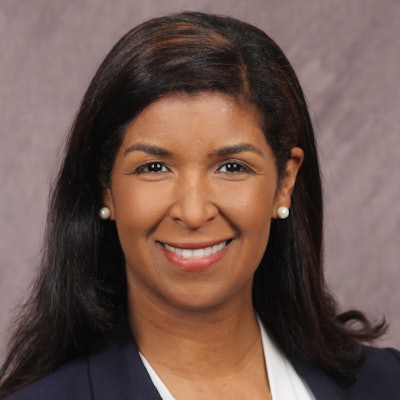With the COVID-19 pandemic pushing the United States economy into a recession, the Lumina Foundation hosted a virtual webinar on Wednesday to discuss labor outcomes, credentials and digital skills necessary to tackle the current job market.
Over 600 people attended the webinar, “Navigating the Work of the Future with LinkedIn and Microsoft,” which also looked at ways the postsecondary education can change within the context of the pandemic and racial inequities.
 Dr. Karin Kimbrough
Dr. Karin Kimbrough“I think it is pretty clear that it is time to set a shift in America’s postsecondary education system,” said Jamie Merisotis, president and CEO of Lumina Foundation. “Both LinkedIn, Microsoft and Lumina Foundation are interested in making learning more accessible and helping to make it more equitable and applicable.”
In August, the unemployment rate was 8.4%, according to the U.S. Bureau of Labor Statistics.
Overall hiring within the U.S. has shown minimal improvement since the middle of August, according to Dr. Karin Kimbrough, chief economist at LinkedIn. Industries such as education, state and local governments and entertainment have continued to struggle financially while real estate, health care, transport and logistics are in recovery.
Over the summer, many students and recent graduates received news about cancelled internship programs and rescinded job offers. Naria Santa Lucia, general manager of digital inclusion and U.S. community engagement for Microsoft Philanthropies, said employers must look at ways to keep these programs up and running either by offering other ways to provide workforce experience or urging policymakers to create funding opportunities.
“It’s really important that we do have that long game in mind,” she said, adding that for those seeking employment, the hiring market now goes beyond earning a degree.
“It’s often about building a constellation of different kinds of credentials,” said Dr. Chauncy Lennon, vice president for the future of learning and work at Lumina Foundation.
 Dr. Chauncy Lennon
Dr. Chauncy LennonTo help individuals, Lennon said there needs to be more information and understanding about what the labor market looks like, where the demand is and what credentials are essential to meet those market needs.
Companies such as Microsoft and LinkedIn are taking that lead. For example, Microsoft looked at those attainable and in-demand skills and created role-based certifications. The certifications are available for free until March 31.
In terms of the overall hiring process, LinkedIn has moved towards using an assessment standard rather than focusing on a potential hire’s credentials or degrees.
“It allows us to cast a wider net to pull in more people who maybe aren’t traditionally equipped with a college or master’s degree but have relevant skills,” said Kimbrough. “I think that’s part of the process is for corporations to push themselves out of their comfort area and be much more thoughtful and intentional about casting a wider net.”
In terms of higher education changes, Lennon recommended individuals to rethink what postsecondary success looks like, going beyond the role of a bachelor’s degree.
“BA’s matter and they are important and powerful tools for many people,” he said. “But we need to recognize that other credentials, whether they are two year degrees or certificates or certifications, are also important critical components of how we are going to help millions of Americans get back on their feet. And get back into the labor market and move forward into stable and successful careers.”
Merisotis said that there are many “outdated attitudes about student success” in higher education.” Additionally, the classroom should teach the typical subjects such as math and English but also those workforce soft skills such as compassion, empathy and ethics.
“I think we all have a stake in the success of today’s students,” said Merisotis. “Because they are increasingly diverse, they represent what our future is about and they really are those human workers of the future.”
Sarah Wood can be reached at [email protected].


















